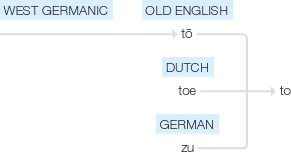To
Old English tō (adverb and preposition), of West Germanic origin; related to Dutch toe and German zu .
wiktionary
From Middle English to(“to”), from Old English tō(“to”), from Proto-Germanic *tō, *ta(“to”), from Proto-Indo-European *de, *do(“to”). Cognate with Scots tae, to(“to”), North Frisian to, tö, tu(“to”), Saterland Frisian tou(“to”), Low German to(“to”), Dutch toe(“to”), German zu(“to”), West Frisian ta(“to”). Non-Germanic cognates include Albanian ndaj(“towards”), Irish do(“to, for”), Breton da(“to, for”), Welsh i(“to, for”), Russian до(do, “to”). Doublet of too.
etymonline
to (prep.)
Old English to "in the direction of, for the purpose of, furthermore," from West Germanic *to (source also of Old Saxon and Old Frisian to, Dutch toe, Old High German zuo, German zu "to"), from PIE pronominal base *do- "to, toward, upward" (source also of Latin donec "as long as," Old Church Slavonic do "as far as, to," Greek suffix -de "to, toward," Old Irish do, Lithuanian da-), from demonstrative *de-. Not found in Scandinavian, where the equivalent of till (prep.) is used.
The nearly universal use of to with infinitives (to sleep, to dream, etc.) arose in Middle English out of the Old English dative use of to, and it helped drive out the Old English inflectional endings (though in this use to itself is a mere sign, without meaning).
Commonly used as a prefix in Middle English (to-hear "listen to," etc.), but few of these survive (to-do, together, and time references such as today, tonight, tomorrow — Chaucer also has to-yeere). To and fro "side to side" is attested from mid-14c. Phrase what's it to you "how does that concern you?" (1819) is a modern form of an old question:
Huæd is ðec ðæs?
[John xxi:22, in Lindisfarne Gospel, c.950]
